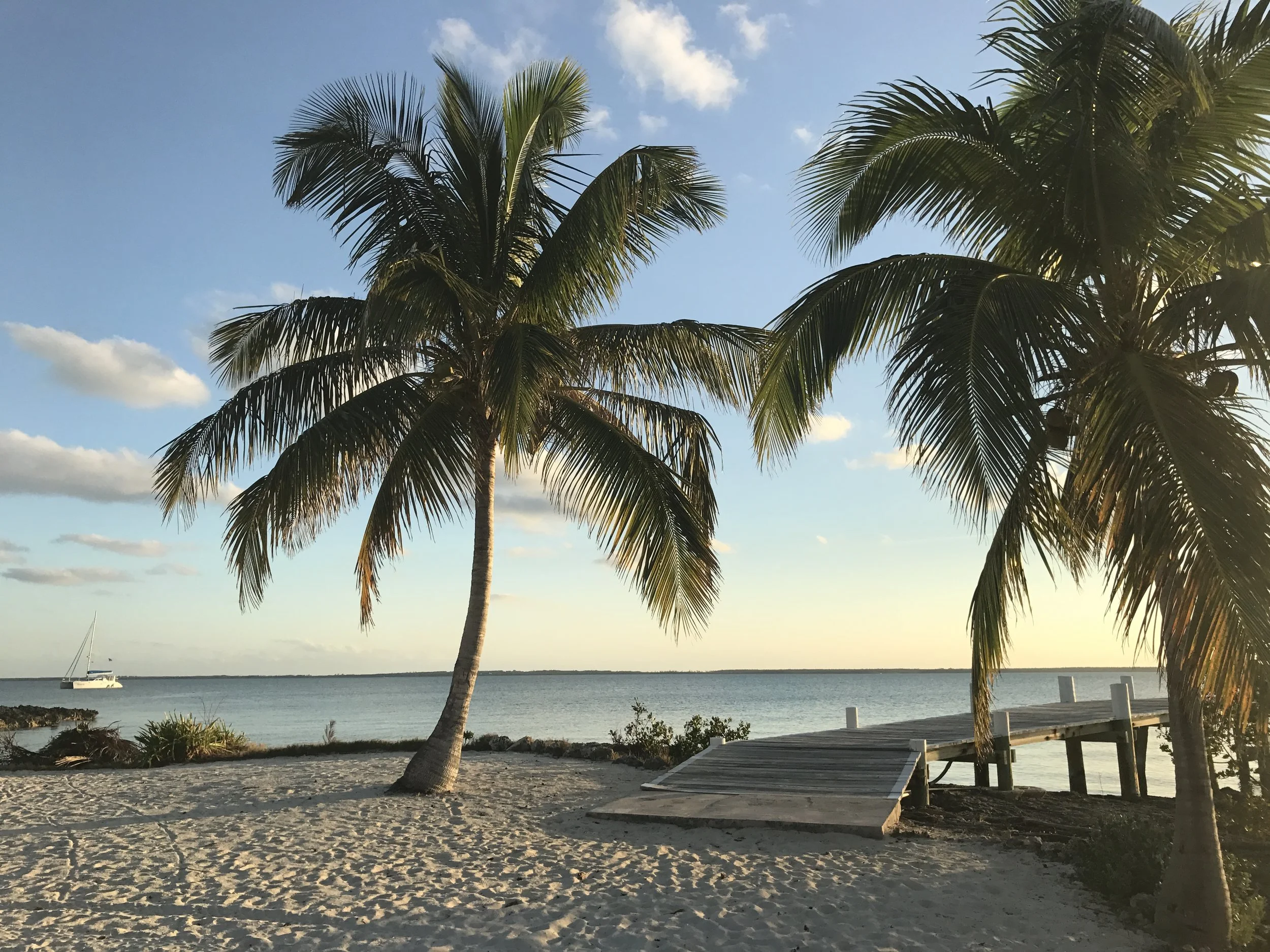Almost two weeks ago we finally made the crossing from Florida to the Bahamas. We are in another country! On our boat! Please, hold your applause, because I am very impressed at us for you.
When we crossed the banks of the Bahamas at sunrise the Thursday before last, Jon turned to me and said with uncharacteristic earnestness, "I can't believe we made it." He wasn't talking about the 12-hour trip across the stream, which was uneventful. He meant made it. Here. With all the variables that could have led to our failure or success. Upon reflection we realized we learned a lot about ourselves as boaters and how we fit into this larger world of cruising that we're a part of.
Cruisers... cut short
We're a long way, physically and mentally, from where we started. We left Maine at the beginning of September and it took us until December to make it to the warm climes of Florida. Not just because our boat goes 6 miles an hour, but because Jon and I have been hard at work building up our businesses and have been flying to clients every few weeks. Then there were the holidays, when we returned home to LA for work and family for an entire month. Boat after boat of people we'd met along the way passed us and made it to the banks of the Bahamas, their Instagram accounts crowing victoriously about warm turquoise waters while we scraped ice off our decks in New Jersey, Virginia, North Carolina.
(Honestly there's nothing more aggravating than seeing people you've just met a few days or weeks prior get to your destination before you. It's the same feeling I get as when I hear about mean girls from high school being successful and happy as adults. It's just not fair!)
Then, somewhere around our downward pass through New York, we went from cruising to delivering our own boat. The weather was getting colder fast, and the way south more and more complicated.
On the East Coast, more than a century of ferry and barge traffic shaped what's known as the Intracoastal Waterway (or ICW for short). The ICW technically runs all the way from Massachusetts down to the tip of Florida, comprising more than 3000 miles of inland natural and manmade canals. Together, they allow you to run the length of the eastern seaboard protected from storms and waves.
While the Cape Cod Canal, which we passed through during the summer, counts as part of the ICW, the real action doesn't happen until around the tip of New Jersey, during which time most boaters who haven't already ducked into the Jersey ICW turn into the Chesapeake and then make their way through what might be the most traveled area of the ICW, the cut through Virginia and North Carolina that circumvents Cape Hatteras.
Once you hit the ICW, there are a lot of factors to contend with: Do we take it at all or go for multi-day trips "on the outside" and knock out hundreds of miles at a go? (We ended up doing five or six overnights, as long as 48 hours, to get down the coast after taking the ICW through to Georgia). Will the tides allow for the draft of our boat to transit without running aground? (probably not, if we're asking this question.) If we follow those buoys will we run aground? (No. Five times running aground later, we now know to follow the damn buoys and don't pay attention to anything else, including our charts and other boaters.)
Captains on delivery (of our own boat)
This is where we somehow turned into captains delivering our own boat... to ourselves. The days were long and stressful, waking up in the pre-dawn and motoring as far as we could before sunset, as the ICW is impassable after dark (there are just too many ways to hit something.) Overnights were easier and got us places faster, but it took me several trips to get over an unfortunate incident off the coast of Jersey that had us caught in 10-foot waves for a good 12 hours. (See image below which speaks for itself. OMFG).
Somewhere between New York and North Carolina, we were no longer sailing. We were motoring, hustling, hurrying and, speaking for myself, generally hating life. It's pretty hard to rush on a boat to begin with, but with temperatures dropping, we didn't have much choice.
Freezing weather and grueling schedule aside, the ICW is a fascinating slice of America. Apart from passing through tiny, historic towns that you'd never otherwise see, to transit the ICW is to be a part of a massive yearly exodus from north to south, in which thousands of boats participate every year.
The snowbird boaters
As we worked our way farther south, the weather warmed again. It gave us a chance to meet some new people, boaters who weren't going past Florida. Surrounded by folks like these, cruising started feeling even more distant to us. These snowbirds, who began to drop off the route as they found their winter slips, didn't feel like the same folks we had run into in the far north. Their boats were lovely and portable condos, and they hold both an untouchable regard and innate fear of cruising to farther regions. Many of these folks never see the Atlantic -- I spoke to several people who had done the entire trip from Virginia down and never touched "the outside" but lived on their boats half the year or more. Others had 2, 5 or 7 year plans for crossing the Gulf Stream and cruising the Bahamas, which runs a mere 4 miles or so off the coast of Palm Beach.
Their lists were long -- lists of reasons why they couldn't go yet, and why we should be concerned about going now. Lists of things our boat and their boats needed to have. All of these lists were passed along with the greatest of kindness. It was lucky that we had come this far, or their concerns would have shaken our confidence. It's easy to see how so many people end up in the boatyard for months at a time at the precipice of the Caribbean.
The white wine cruisers
And then suddenly, we were in the Bahamas. We were suddenly here, with no plans except to follow weather and sites that we wanted to explore. We're happy to call ourselves cruisers again.
But something curious has happened since we've arrived, and I can't help but notice and point it out. Somewhere across the Gulf Stream, it became detestable to work. Or rather detestable to others that we still have to work.
It feels extra odd because of the number of people we've met in getting here that were working toward something: buying their boat, making their 5-year plan to leave, waiting for their kids to go to school so they can set off. We've arrived at the end destination, so to speak, and it's as if no one wants to be reminded about how they got here.
(Surely part of this is due to the fact that we're working on our laptops in the middle of everyone's vacation. Nobody wants to be reminded of the work they left at home.)
But as I work from a diner-cum-liquor-store in the mornings, I find myself getting scolded by cruiser after cruiser to "put the laptop down". One southern fellow, (whom I've taken to calling Foghorn Leghorn), has ranted at me multiple mornings in a row in an exchange that goes something like this:
"Honey, you're a real gigabyte girl aren't ya? I'mma give you five more minutes before I take them gigabytes away so you go outside."
I explain that I have to work so I could enjoy all the island had to offer.
He stares, wide-eyed, unsure how to answer. Then he yells, "Honey, good luck on the gigabytes!" and then walks away, slamming the screen door behind him.
An hour or two later, as I'm walking back to the boat, he pulls up in a golf cart next to me:
"Honey, you get all those gigabytes in?"
"Yup, I got all the gigabytes," I tell him, as he steps on the gas and putters away.
Returning to the boat, on the first day of said exchange, I passed six boats on the dock. Four of them had owners in their cockpits, sharing a bottle of white wine with each other at lunch. Like us, these white wine cruisers no longer have a transit schedule to keep, or a weather window to catch, per se. But they have literally no other demands on their time, and as such look at us as we pass like odd foreign creatures with our laptops and conference calls. We're all cruisers, but once again I'm beginning to realize we're not all the same.
To try to keep a normal schedule in the face of such luxurious temptation is a challenge. I always thought that the hardest part of cruising would be working, not the peer pressure to stop working.
As of yet, we haven't met anyone in the Bahamas that is our age or working while they go. But we've only just started exploring the Abacos, so I'm sure we'll come across like minds soon.
As for what we'll call ourselves, I've sort of warmed up to the term Gigabyte Girl. What other nicknames have you heard for cruisers like us? I'm sure that Killjoy is on the list!


